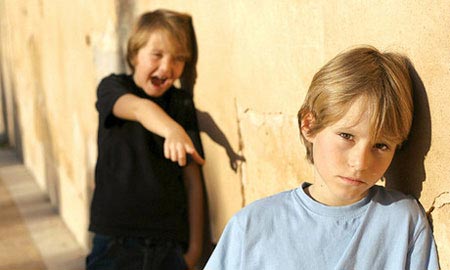Children have to go through a certain amount of peer pressure during adolescence. Read on to know more about peer pressure in teenagers.Peer pressure is a reality at every stage in life. People like to be modeled and tend to develop an attitude that is similar to the ones that they are surrounded with. This can happen at school, college or workplace. Peer pressure for an adolescent or a teenager is a sensitive issue as the teenager is still in the process of adapting and accommodating himself or herself with the world that he or she has just begun to know. They want to fit into a peer group and are wary of being labeled as “uncool” if he fails to do so. There is a tendency of going to any extent to be accepted as a part of the group. This is a phase when the teens give utmost importance to the opinions of the peer group, perhaps more than the parents and relatives. There is therefore a big chance that a negative peer pressure can do irrevocable damage to the teen’s physical and mental well-being. In this articleImpact Of Peer Pressure In TeensGood CommunicationIndulge In Role PlayingOpen DiscussionMonitor Child’s ActivitiesBe A Patient ListenerAvoid CriticismImpact Of Peer Pressure In Teens Teens succumb easily to peer pressure as they want to be alone with people of their age. Since peer pressure can be both positive and negative. As a positive impact the child becomes serious with studies and begins to plan a career, participates in other positive activities like school curriculum and social activities while the negative impacts can be extremely dangerous. This is a phase of life when there are myriad questions in the minds of the teens. They are experiencing a host of physiological and emotional changes in their behaviour. Often they are so overwhelmed with these rapid changes that they become extremely vulnerable. At this moment if they happen to become a part of a negative peer group they can get lured into a lot of potentially harmful practices. Most of the times these practices start with experimentation which happen to get transformed into addictions, which eventually lead to behavioural disorders in extreme cases. They can range from smoking, drug abuse, alcohol and casual sex. How Can Parents Help? Parents can help the teen deal with negative peer pressure through some simple methods like: Good Communication Make sure that you develop and maintain a good communication link between yourself and your child. The teen should feel free and comfortable in discussing all his peer related issues with you. Indulge In Role Playing You require a fair amount of foresight as you think about probable situations and role play them in your house. This will act as coaching lessons to the teen and he or she will know the possible situations that he might face, and will be equipped to react to them accordingly. Open Discussion Hold an open discussion about all the possible peer pressure negative activities like stealing, smoking, alcohol and drug abuse and casual sex. Be factual as you explain why they are harmful. Clear doubts if they have any. Monitor Child’s Activities Monitor the activities of your teen but don’t be autocratic in your approach. Nothing backfires more than autocratic behavior from the parents. It alienates the teen from the family and pushes him towards his peer group. Be A Patient Listener Become an involved parent but never turn a moral preacher. As they share their activities and thoughts with you take the opportunity to guide them where necessary. Avoid Criticism Do not criticise the teen for his negative attitude in a way that humiliates them. Making them feel shameful will dent their confidence and they will lose the strength to fight out negative peer pressure. They will also feel uncomfortable in your presence and avoid discussing their problems with you or take your advice. At times the impact of the negative peer pressure is so huge that it cripples the emotional and psychological stability of the teen even in his later life. It is therefore important that the teen is protected from the negative peer pressure so that their physical and mental well being is ensured. Parents can play a great role in helping the teen deal with peer pressure through effective communication, care and support.
Children have to go through a certain amount of peer pressure during adolescence. Read on to know more about peer pressure in teenagers.Peer pressure is a reality at every stage in life. People like to be modeled and tend to develop an attitude that is similar to the ones that they are surrounded with. This can happen at school, college or workplace.
Peer pressure for an adolescent or a teenager is a sensitive issue as the
teenager is still in the process of adapting and accommodating himself or herself with the world that he or she has just begun to know. They want to fit into a peer group and are wary of being labeled as “uncool” if he fails to do so.
There is a tendency of going to any extent to be accepted as a part of the group. This is a phase when the teens give utmost importance to the opinions of the peer group, perhaps more than the parents and relatives. There is therefore a big chance that a negative peer pressure can do irrevocable damage to the teen’s physical and mental well-being.
Impact Of Peer Pressure In Teens
Teens succumb easily to peer pressure as they want to be alone with people of their age. Since peer pressure can be both positive and negative. As a positive impact the child becomes serious with studies and begins to plan a career, participates in other positive activities like school curriculum and social activities while the negative impacts can be extremely dangerous.
This is a phase of life when there are myriad questions in the minds of the teens. They are experiencing a host of physiological and emotional changes in their behaviour. Often they are so overwhelmed with these rapid changes that they become extremely vulnerable. At this moment if they happen to become a part of a negative peer group they can get lured into a lot of potentially harmful practices. Most of the times these practices start with experimentation which happen to get transformed into addictions, which eventually lead to behavioural disorders in extreme cases. They can range from smoking, drug abuse, alcohol and casual sex.
How Can Parents Help?
Parents can help the teen deal with negative peer pressure through some simple methods like:
Good Communication
Make sure that you develop and maintain a good communication link between yourself and your child. The teen should feel free and comfortable in discussing all his peer related issues with you.
Indulge In Role Playing
You require a fair amount of foresight as you think about probable situations and role play them in your house. This will act as coaching lessons to the teen and he or she will know the possible situations that he might face, and will be equipped to react to them accordingly.
Open Discussion
Hold an open discussion about all the possible peer pressure negative activities like stealing, smoking, alcohol and drug abuse and casual sex. Be factual as you explain why they are harmful. Clear doubts if they have any.
Monitor Child’s Activities
Monitor the activities of your teen but don’t be autocratic in your approach. Nothing backfires more than autocratic behavior from the parents. It alienates the teen from the family and pushes him towards his peer group.
Be A Patient Listener
Become an involved parent but never turn a moral preacher. As they share their activities and thoughts with you take the opportunity to guide them where necessary.
Avoid Criticism
Do not criticise the teen for his negative attitude in a way that humiliates them. Making them feel shameful will dent their confidence and they will lose the strength to fight out negative peer pressure. They will also feel uncomfortable in your presence and avoid discussing their problems with you or take your advice.
At times the impact of the negative peer pressure is so huge that it cripples the emotional and psychological stability of the teen even in his later life. It is therefore important that the teen is protected from the negative peer pressure so that their physical and mental well being is ensured. Parents can play a great role in helping the teen deal with peer pressure through effective communication, care and support.






























